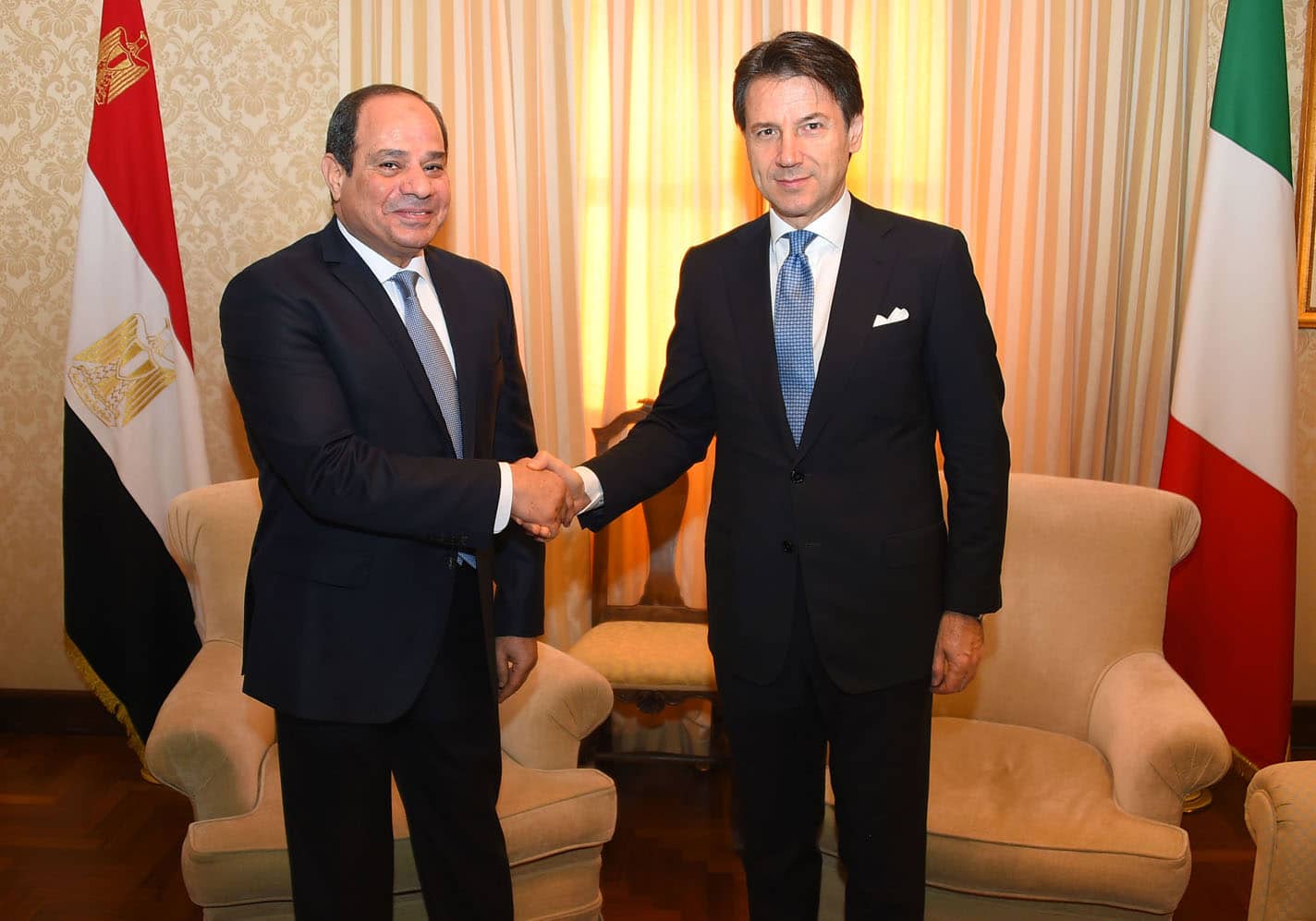Italy and France both have strong relations with Egypt, but Paris proved capable of ignoring Italian (and European) uneasiness on human rights to further its own interest. Professor Alessia Melcangi (Atlantic Council) examines the interconnected dossiers
When it comes to Egypt, matters become tense in Europe. A few weeks ago, the European Parliament passed a resolution calling on member states to consider a “unified and resolute” answer to the Egyptian government’s crackdown on human rights.
Egyptian authorities do have the tendency to suppress internal dissent and incarcerate human right advocates and lawyers. This matter is particularly heartfelt in Italy, a country who had the chance to witness the Egyptian method in action.
After a lengthy and tortuous investigation, Italy has charged Egyptian security officials with the torture and murder of Giulio Regeni in 2016, a claim that Cairo rejects. Furthermore, Patrick Zaki, an Egyptian human rights student who resided in Italy, is being detained by Egyptian authorities since February on flimsy charges.
Thus, when French President Emmanuel Macron gave his Egyptian counterpart Abdel Fattah Al-Sisi the highest French award, some Italian reacted with rage, and a few of those who had received the same award returned it in protest.
Tellingly, the video was circulated by the Egyptian press only: Paris only held a presser after the leaders met.
And yet, this focus on human rights did not prove strong enough to impact Rome’s economic ties with Cairo. France and Italy are similar, in that they both enjoy a historic, multifaceted preferential relationship with Egypt, which encompasses fruitful economic deals (including military vehicles, weapons, and energy).
The two European countries diverge on how they bring forward their relationship with Egypt, argues Alessia Melcangi, who teaches contemporary MENA history in the Sapienza University in Rome and holds the status of non-resident fellow at the Atlantic Council.
Economically, the commitment on both sides has been growing, explains Ms Melcangi. 130 Italian companies operate in Egypt, producing over $2,5 billion a year, and the military deals, worth $872 million in 2019, could potentially climb to $9 billion.
“The other plain is the geopolitical one, where Egypt and Italy assume different stances on key dossiers, such as Libya,” continues the expert. Indeed, Rome has supported the UN-backed government in Tripoli from the get-go, whereas Egypt (and France) have been attempting to overthrow it by supporting its opposing faction, general Khalifa Haftar’s Libyan National Army stationed in Cyrenaica.
Still, on Sunday Egyptian officials flew to Tripoli for the first time in years to meet with government officials, signalling their interest in restoring a degree of diplomacy with the UN-backed government. “Egypt is switching from war threats to negotiation. A position that the UN has recognised, which is what [Mr] Sisi wants,” added Ms Melcangi.
The professor summed up the West’s questionable support for Mr Sisi in the “old problem of democracy against stability […] [his] government seems more solid than potential Islamist drifts.” And therein lies Egypt’s geopolitical connection with France, she argues.
“The underlying theme of the war on political Islam, which has characterised [Mr] Sisi’s guidelines, is similar to [Mr] Macron’s confrontation with separatist Islam.” By blurring the lines between political activism (i.e. the Muslim Brotherhood) and extremism, Mr Sisi can “justify the repression of internal rivals.”
Thus, France’s relationship with Egypt is excellent under both the economic and the geopolitical profiles. But it has to be maintained: hence why, argues Ms Melcangi, Mr Macron ignored issues of human rights – such as the Italian report on Egypt’s responsibility in the murder of Giulio Regeni – in spite of his European allies.
As our own Emanuele Rossi writes, France is taking advantage of the gaps that these [geopolitical] dimensions leave open to further its own interest. Paris sees Italy as a direct competitor in the whole Mediterranean area (as both countries share several objectives and areas of influence) and tends to advantage itself whenever it can.
However, argues Stefano Stefanini, senior advisor at ISPI and former Italian representative at NATO, it would be wishful thinking to hope that other EU nations (such as France) bail Italy out of its geopolitical issues. Realpolitik dictates that each nation, regardless of their shared commitments, must strive to protect its own interests.
Hence, Italy would do well to avoid “useless moralising” and “put its card on the table with the French president,” argues the expert. Likewise, recalling the Italian ambassador from Cairo is especially useless now that he’s needed the most. Italy must maintain its bilateral dialogue with Egypt while keeping the Regeni matter in its sight.
“Doing foreign policy, in this case, entails demanding justice on [the] Regeni [case] and requires realism in acknowledging that the relationship between Italy and Egypt is strategic. There’s a national interest in cultivating it, even if the homicide of our young researcher remains an unresolved knot and our deep dissatisfaction mustn’t be hidden. Tough? Yes – but that’s foreign policy.”








